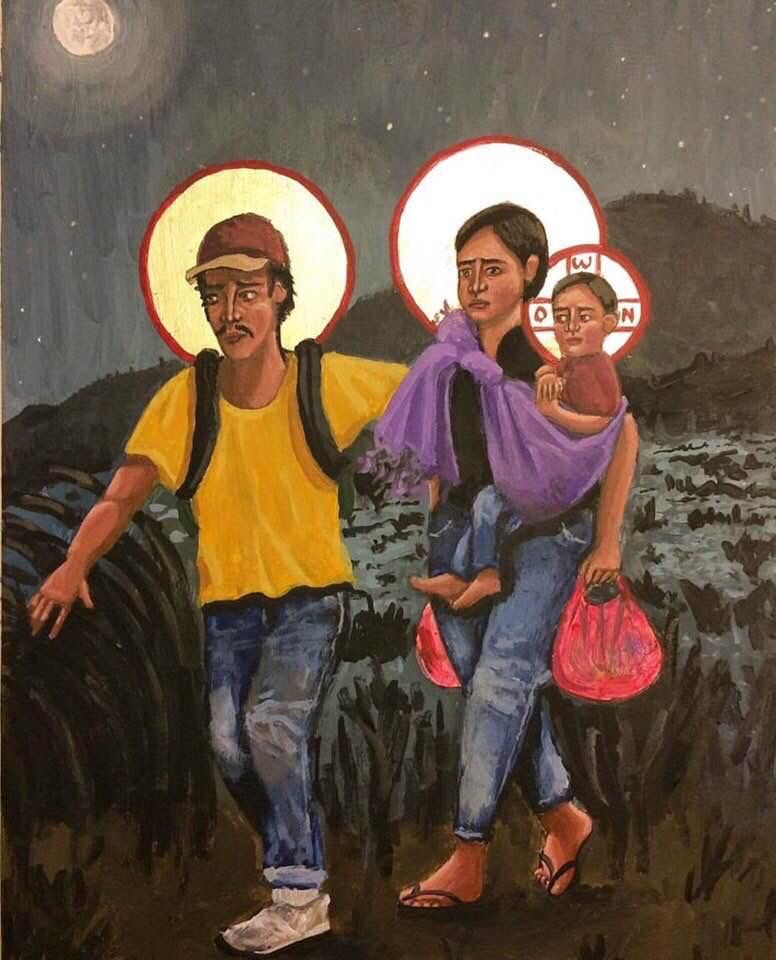
27 Mar SAINT JOSEPH; PATRON SAINT OF MIGRANTS/FACI INTERNATIONAL
On March 16, the international FACI invited us to a holy hour-adoration online to walk together hand in hand with Saint Joseph, accompanying migrants. We participate from many places and share the following reflection:
By thinking of “Saint Joseph, patron of migrants” we can read the Pope’s message for the year of Saint Joseph and we can also contemplate: contemplate Saint Joseph as the patron saint of migrants and contemplate again people in Human Mobility, migrants, refugees …
When I stopped to contemplate I was faced with two scenes, the classic image of the flight to Egypt that begins with the dream of St. Joseph and in parallel the first images seen on TV of caravans of people in human mobility, who in that case were refugees fleeing the genocide in Rwanda (1994).
What struck me more deeply than the pain and suffering that was certainly immeasurable in that conflict was the fact of seeing them walk for days and days….
I felt that there was something more than the animal instinct for survival … this is something I have confirmed over the years accompanying refugees and migrants.
Despite the physical weight carrying their most valuable belongings on their backs, the psychic and spiritual weight on their souls of having to leave their roots and having seen so many brutal scenes of violence… they walked upright. That is the first characteristic that differentiates primates from humans, walking upright with their eyes on the horizon…beyond the immediate…it means that there is hope, there are dreams of something better, there is a beyond….
In the case of migrants and refugees, most of the time it is a desire that my descendants do not suffer what I have suffered, it is a mission, a what for as well as a why (to survive)…
St. Joseph, in fleeing to Egypt with Mary and the Child, also had a what for, deeper than the why. The why was to save himself from the slaughter of the innocents, the what for is a mission received: … to help Jesus, Son of Mary and Son of God, to grow up….
This is why my experience and that of anyone else, when we accompany and try to help migrants and refugees with compassion has so much to do with mission and collaboration… to connect with people’s dreams and projects, far beyond offering occasional material aid, far beyond assistance or believing that the objective is for them to live like “me” or taking it for granted that this is what they want…
When the Pope declared the year of Saint Joseph and named Saint Joseph the patron saint of migrants, he pointed out some characteristics of Saint Joseph that can enlighten us….
I will highlight some of these qualities that awaken my devotion… Regarding devotion: St. Ignatius at the end of his life (and of so many contemplations) said Always growing in devotion, that is, in ease of finding God... (Aut. 99) …
– The first has to do with an extraordinary capacity to “let go of the reins”, to hand over the helm of the boat to God… especially “in the midst of the storms of life, says the Pope”. Sometimes, we would like to have everything under control, but God always has a wider view and if we leave at least small gaps, God slips in and takes the helm, even if it is through dreams as it happened to Joseph… And then what seems impossible, very unreasonable, a craziness makes its way… Says the Pope: “Joseph welcomed Mary without setting conditions”…Faced with the “disappointment and rebellion” that is born in the face of disconcerting facts and situations, the Pope notes how “Joseph puts aside his reasoning to give way to what happens and, however mysterious it may seem to him, he welcomes it, assumes responsibility and is reconciled with his own history.” There are no regrets or victimhood… “Joseph’s happiness is not in the logic of self-sacrifice, but in the gift of himself. Frustration is never perceived in this man, but only confidence”.
– This letting God take the helm, which is the foundation of living by Faith, did not free Joseph from commitment… The Faith and Hope that spring from knowing that he is protected and sent on mission by God are an ACTIVE Faith and Hope (GC XXI). The first thing Joseph was asked to do, as I have said, was to “reconcile himself with his own history…very far from what he had surely projected”. “If we do not reconcile ourselves with our history, we will not even be able to take the next step, because we will always be prisoners of our expectations and the resulting disappointments,” Francis advises. It is this acceptance that will be the starting point for “a greater story, a deeper meaning”. In this sense, the Pope clarifies that “Joseph is not a man who resigns himself passively”. “He is a courageous and strong protagonist”, which leads him to affirm that it must be “far from us to think that believing means finding easy solutions that console”. “He did not look for shortcuts, but faced what was happening to him ‘with his eyes open'”…
– Another call of attention from the Pope that we can all listen to …is that call to “not be of the world” in the sense of not letting ourselves be carried away by the criteria of valuation dominant in our societies… It is valuable those who shine, attain professional and economic success, triumphs, is handsome, famous, etc. (this pandemic has shown that all that is of little value…) Saint Joseph reminds us that all those who are apparently hidden or in the “second line” have an unrivalled protagonism in the history of salvation” says the Pope… I think of so many fathers, mothers, older brothers and sisters who fleeing from conflict and poverty do everything for their children or younger siblings… often having to accept that their sons and daughters “do not become what they had dreamed of for themselves”… sowing, trusting and welcoming even in the mystery many times… I don’t think Joseph dreamed of seeing his Son crucified.
– And finally something that is gaining more and more strength due to the pandemic and that could be considered one of the wings with which the Pope encourages us to fly in this difficult time in which rather than flying, it seems that we can only crawl.
I am talking about the new paradigm of CARE that Pope Francis invites us to develop and promote. The other wing would be the encounter and dialogue so necessary also in the world of migration and interculturality
But let us return to St. Joseph and to care. It is possible that today the first visible expression of evangelization is care, more than doctrinal teachings, liturgy or sacramentality… In reality this should not be something new, Jesus went through the world doing good, caring and looking after people who crossed his path…
Just as God counted on Joseph for the care of Jesus, so He counts on us…. “Thus, every needy person, every poor person, every suffering person, every dying person, every foreigner, every prisoner, every sick person is”the Child” whom St. Joseph continues to protect and hence the invitation to invoke him “as protector of the destitute, the needy, the exiled, the afflicted, the poor, the dying”. “From Joseph we must learn the same care and responsibility: to love the Child and his mother…”. A care that is exercised from the dynamic of gift and therefore is never possessive, nor paternalistic … but seeks to help to grow … The Pope goes so far as to say “The world needs fathers (and mothers), it rejects masters” … ” When a vocation, whether in married life, or consecrated life does not reach the maturity of self-giving stopping only in the logic of sacrifice (and success) , then instead of becoming a sign of the beauty and joy of love, it runs the risk of expressing unhappiness, sadness and frustration”. “Whenever we find ourselves in the condition of exercising paternity/maternity, we must remember that it is never an exercise of possession, but a ‘sign’ that evokes a superior paternity”, meditates the Pope, who calls to respect the freedom of children in the style of St Joseph who “always knew that the Child was not his own, but had simply been entrusted to his care”….
I would like to leave two questions for you…
– In meeting migrants, refugees, the excluded, do I allow myself to be moved by compassion, but also to connect with and to encourage their dreams, their aspirations, their “what for” beyond mere survival and trying to meet their needs…?
– who does God entrust to my care today, as Jesus was entrusted to Joseph?
Inés Oleaga, aci


